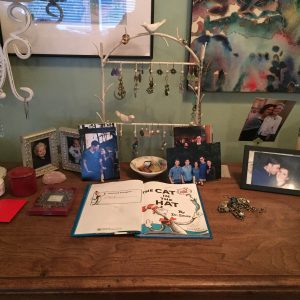In his book Tribe: On Homecoming and Belonging, Sebastian Junger writes: Humans don’t mind hardship, in fact they thrive on it; what they mind is not feeling necessary. Modern society has perfected the art of making people not feel necessary. It’s time for that to end.
More than anyone else, those with differing abilities, atypical neurology, and slower response times are in danger of a marginalization that leads them to feel unnecessary. We want to do for them, but what they really need is to do for us.
 I see this in Zack. He may have only a few skills, but he wants to use those to the benefit of others. He has a natural gift of service that will be practiced, whether those he intends to serve want it or not. When his gifts are accepted, he beams. When they are shunned, he retreats with sadness. He feels personal value when he contributes, just like everyone else.
I see this in Zack. He may have only a few skills, but he wants to use those to the benefit of others. He has a natural gift of service that will be practiced, whether those he intends to serve want it or not. When his gifts are accepted, he beams. When they are shunned, he retreats with sadness. He feels personal value when he contributes, just like everyone else.
We make a lot of assumptions about those without a voice, whether they are considered nonverbal because of autism or another disability, speak a different language than ours, are too young or old to speak clearly, or simply choose not to talk. Most of these assumptions suit our own convenience. It is easier on our conscience to assume they don’t really care about contributing, or that they are unable to do something, because they express themselves differently than we do. The harder option is to take the time to figure out what the person wants and is able to do, and allow them to do it.
Why can’t we wait just a minute longer to allow someone slower or less capable than we are to complete a task? Does it really matter if our meal is served in three minutes instead of five, or that our waitress needs the time to write down our order rather than remembering it? Do all the forks really have to face the same direction and all the towels be folded perfectly? There is room for those with differing abilities to find meaningful work and volunteer opportunities in our world–to be contributing members of society–if we would make the space and time for them.
 Every morning, Zack follows his routine to fulfill internal duties. He turns on lamps throughout the house—four in the living room, one in the guest room, one in his dad’s office. (At night before going to bed, he turns these off.) When leaving for school, he makes sure all the cupboards in the kitchen are closed and the doors to closets shut. Sometimes he lines up his drawings on the living room coffee table, and other times he clears everything off and puts all the items on the floor as if to say, “Enough of this clutter. I need some space!”
Every morning, Zack follows his routine to fulfill internal duties. He turns on lamps throughout the house—four in the living room, one in the guest room, one in his dad’s office. (At night before going to bed, he turns these off.) When leaving for school, he makes sure all the cupboards in the kitchen are closed and the doors to closets shut. Sometimes he lines up his drawings on the living room coffee table, and other times he clears everything off and puts all the items on the floor as if to say, “Enough of this clutter. I need some space!”
I may not track with it, but there is a definite order to my son’s thinking. There have been times I noted Zack to be much tidier than his father and elder brother. I appreciate that about him.
Zack loves to nurture other people. One way he does this it by keeping Jay and me hydrated by bringing us water in a glass filled to the brim. He walks slowly across the room to present it to us, and sometimes he takes a sip or two on the way. He lets me know when my coffee is ready but will not carry it to me because of his aversion to “hot.” And he loves to refill wine glasses with Sparkling Cider when we have guests.
It’s kind of like having a butler, living with Zack. If I leave the house and he thinks I am forgetting something, he races after me to make sure I have it. Whenever I come home or leave, he comes to the door to greet me or say goodbye. He greets most of our visitors.
 These are only a handful of skills, when you think about it. But Zack is faithful to do them, day after day. Along with taking care of himself as much as he is able, these actions for the greater good are part of what makes him feel necessary. He is helping to keep our home running. In time, he’s added new duties to his repertoire—clearing his place from a meal and putting the dishes in the dishwasher; carrying groceries in from the car; helping us when we shop for groceries by retrieving items throughout the store; and reaching for things too high on a shelf for me to grab. He particularly likes that last duty, and finding my cell phone whenever I cannot locate it.
These are only a handful of skills, when you think about it. But Zack is faithful to do them, day after day. Along with taking care of himself as much as he is able, these actions for the greater good are part of what makes him feel necessary. He is helping to keep our home running. In time, he’s added new duties to his repertoire—clearing his place from a meal and putting the dishes in the dishwasher; carrying groceries in from the car; helping us when we shop for groceries by retrieving items throughout the store; and reaching for things too high on a shelf for me to grab. He particularly likes that last duty, and finding my cell phone whenever I cannot locate it.
I recently recognized another of Zack’s favorite duties: making sure The Cat in the Hat (our second copy) stays open on the top of my dresser, whether I want it there or not. That way it’s always handy when we need it.

